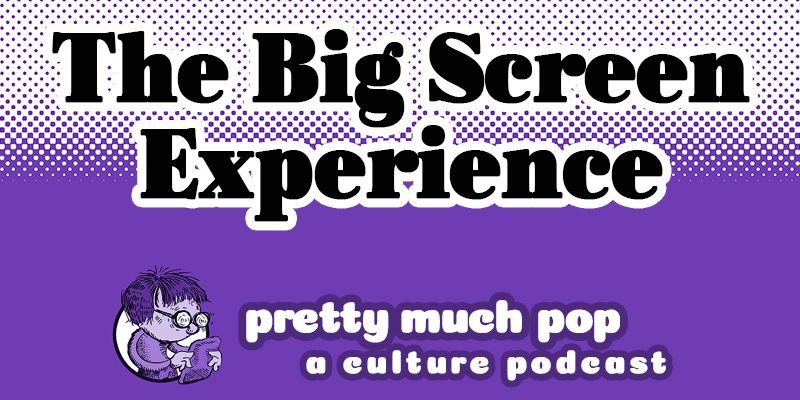
The pandemic has kept us out of the movie theaters, forcing new streaming practices so that films can be released at all, but as these restrictions end in 2021, do we want things to go back just to the way they were?
Your hosts Mark Linsenmayer, Erica Spyres, and Brian Hirt reviewed many articles where filmmakers fretted about the future of cinema. Even before the pandemic, concerns about falling movie house attendance and the increased use of streaming have had the industry worried about films being viewed in the manner their creators intended, or even made at all.
For at least the first half our of this discussion, we largely ignored all that in favor of musing on our own past theater-going habits and experiences. What has worked and hasn’t in the shift toward more spectacle and amenities? What do we like and loathe about being in an audience with others? Is the theater experience essential just for big special effects films, or does it make any film more effective? How would we improve moviegoing and home viewing? We consider the list of films that were supposed to come out this year and were either delayed or moved to streaming, like Tenet, Soul, In the Heights, etc.
Here are those articles, in case you’re curious:
- “Every Movie Release Date Affected by the Coronavirus Pandemic” by Christopher Rosen
- “Hollywood’s Obituary, the Sequel. Now Streaming.” by Brooks Barnes
- “On the Future of (Going to the) Movies” by Jordan Crucchiola
- “The Future of Movie Theaters In the Age of Coronavirus: A Dialogue” by Brent Lang, et al
- “Streaming Is the Future for 2021, but I’m Not Convinced It’s the Future of Movies” by Matt Goldberg
- “Michael Shamberg On How The Theatrical Business Can Rebound From Covid-19″
- “How Will Movies Survive the Next 10 Years?” by Kyle Buchanan
- “Here’s How Movie Theaters Will Survive the Next 10 Years: Exhibitors Speak Out” by Eric Kohn
- “Christopher Nolan Rips HBO Max as “Worst Streaming Service,” Denounces Warner Bros.’ Plan” by Kim Masters
- “Patty Jenkins, Aaron Sorkin on Warner Bros.’ HBO Max Shocker: ‘We’re All Scared Everything’s Going to Change Now’” by Adam Vary
- “After Warner Bros.: The New Long-Term Deal Hollywood Studios, Movie Theaters and Netflix Need” by Eric Rosenbaum
Hear more of this podcast at prettymuchpop.com. This episode includes bonus discussion you can access by supporting the podcast at patreon.com/prettymuchpop. This podcast is part of the Partially Examined Life podcast network.
Pretty Much Pop: A Culture Podcast is the first podcast curated by Open Culture. Browse all Pretty Much Pop posts.






